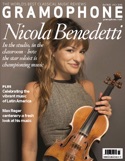Texte paru dans: / Appeared in: |
|
|
Outil de traduction (Très approximatif) |
|
|
Reviewer:
Edward Breen The Choir of Westminster Cathedral have a long and illustrious association with late-Renaissance Iberian polyphony. This new disc of works by Alonso Lobo, Victoria’s contemporary, can be seen as the latest in an extremely distinguished lineage, especially welcome since it champions a composer still under-represented on disc.
Lobo was a choirboy under Francisco Guerrero at Seville Cathedral and the Missa Maria Magdalene is based on his teacher’s motet. Readers may recognise these works from The Tallis Scholars’ 1997 recording, yet despite similar tempi the larger forces of Westminster Cathedral Choir lend them a greater sense of grandeur. Indeed, among the most admirable qualities of both groups, instantly apparent when these albums are compared, is their ability to generate polyphonic momentum and an unmistakably personal sound. For Westminster Cathedral Choir this generally means that tempi are on the slow side, dictated by their cavernous home acoustic and also by their richer low voices. Here, the great polyphonic arches of Lobo’s Mass can feel slightly overwhelming; but, as ever with this choir, the performance is keenly assured and the Hyperion team has produced a wonderfully atmospheric recording.
Nothing, however, will prepare listeners for the beauty of Lobo’s Lamentations. Those who know them from Bruno Turner’s 2002 recording with Musica Reservata de Barcelona (La Ma de Guido) will find this performance statelier. This is a good thing: as the cycle unfolds it becomes apparent that Lobo uses the Hebrew letters as elaborate weeping gestures, a point made by Bruno Turner in his booklet-notes. Listen especially to the first setting of ‘Iod’ (tr 14) as a heart-
stopping
example of the famous Westminster Cathedral treble sound. This, for me, is as
good as it gets both in terms of performance and in terms of a school of
polyphony beyond the works of Victoria. Elsewhere, Lobo’s animated word-setting
in the motet O quam suavis est, Domine displays a quick-witted urgency
that provides welcome changes of texture. |
|
|
Consultez d'autres mois / Browse other months
|
|
|
|
|
|
Cliquez l'un ou l'autre
bouton pour découvrir bien d'autres critiques de CD |
|




